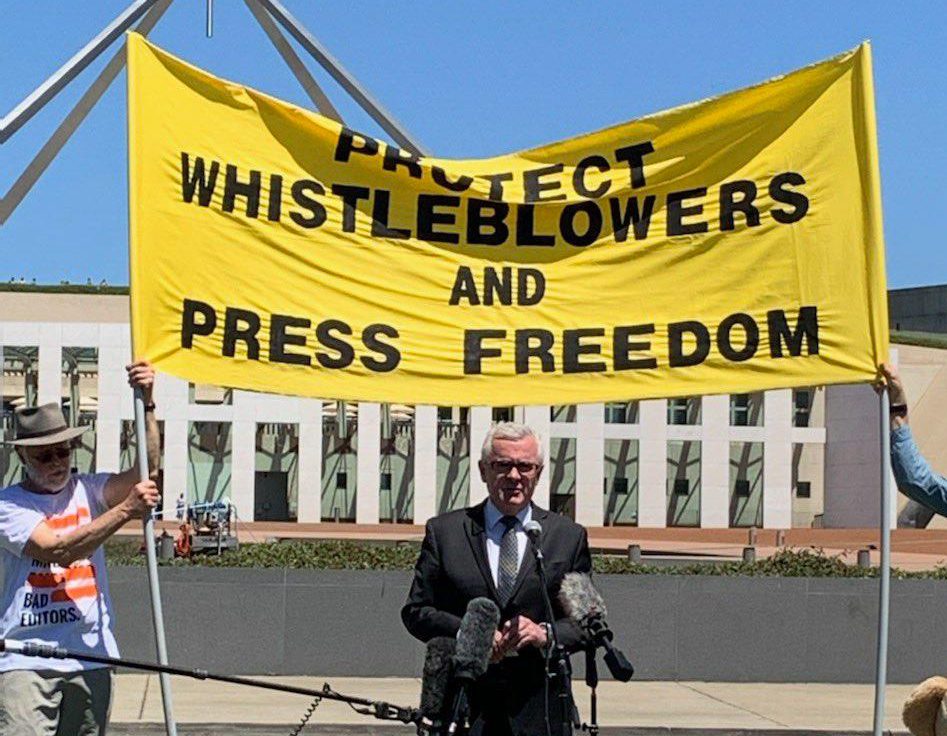Amid a recent storm of national debate regarding personal freedoms, independent federal MP Andrew Wilkie is fighting to introduce a bill of rights to Australia.
At the second reading of the bill in September, Mr Wilkie cited government policy on asylum seekers, the treatment of Aboriginal and Torres Strait Islander people and the recent AFP raids on journalist’s offices as examples of the importance of implementing a bill of rights.
“Australia doesn’t have a bill of rights, and we need one” he told Hatch.
“People’s fundamental rights are not protected in this country … and I find that remarkable.”
The “Australian Bill of Rights Bill 2019” would outline articles regarding human rights in the law, but would not enshrine them into the constitution; such an action can only be achieved via referendum.
It has received modest support from the parliament, but notably not from either of the major parties.
“They (the Government and Opposition) don’t like it, and I know why they don’t like it; because they want to be able to do what-ever they want while they’re in government,” Mr Wilkie said.
Australia needs a national Bill of Rights that protects and promotes unalienable human rights, such as the right to healthcare, the right to housing, the right to education and the right to equal treatment within society #politas #auspol https://t.co/a5qggd7nkX
— Andrew Wilkie MP (@WilkieMP) September 16, 2019
He also noted that Australia was the only democratic country in the world to not have a bill or charter of rights, although some states, including Victoria, have charters of human rights.
In the case of Victoria, however, this charter is limited in its scope, merely allowing citizens who find proposed legislation in breach of the charter to appeal it to the Supreme Court, which in turn can alert the legislature of the inconsistency.
The legislature is free to ignore that declaration.
The Wilkie bill contains articles relating to freedom of expression and freedom of the press, cultural rights of Aboriginal and Torres Strait Islander people and rights to adequate standards of living, including housing and clothing, among others.
Many Australians may be surprised to hear Australia does not have a bill of rights, particularly pertaining to freedom of expression. But as Carlo Delora, PHD candidate in Law at Monash University explained, Australia’s constitution contains very few explicit rights.
“There is (only) a very limited implied right to freedom of speech, providing that speech is directed towards an issue of political communication,” he said.
“It’s a freedom from government interference on those topics (such as political representation). It’s not a personal right, it’s a negative right.”
Whether to introduce a bill of rights to Australia has been debated since Federation, and not everyone agrees it is the correct move.
John Elferink, a former Attorney General of the Northern Territory, told Hatch Australia already had adequate protections for human rights through individual laws, and said the Wilkie legislation a “bill of rights” was misleading.
“To call it a bill of rights when it’s just another law capable of amendment … doesn’t protect the fundamentals any further than any other law,” he said.
“So why create a mystique around it when it is no such thing?”
Mr Elferink objects to introducing bills of rights generally too. He advocates legislating change in laws which can be amended through the democratic process, rather than requiring constitutional change which requires a referendum.
Passing referendums is notoriously difficult in Australia, requiring a majority vote in a majority of states. Only 8 out of 44 have passed since Federation.
“I am in the first instance a supporter of the democratic principal before I am a supporter of any other motion,” he said.
“The moment you lock something in constitutional environments, you’re limiting the democratic process, not expanding upon it. The more prescriptive the constitution is, the less democratic the society is.”
Enshrining rights into the constitution also freezes them in the time they were written, which can cause friction as society and technology evolve, Mr Elferink said, citing the on-going debate in the US surrounding the 2nd amendment.
The amendment – written at a time when the most common type of weapon was a flint-lock musket – has been used by gun advocates such as the National Rifle Association to argue for lax gun regulation in the US.
“If the founding fathers had been presented with the consequences … would they have been as liberal with their protection?” Mr Elferink said.
The debate has been played out in the US court system for decades now, and, as Mr Delora argues, has led to the judiciary becoming engaged in the political process, something Australia needs to be wary of.
“Whatever format the bill of rights takes, we need to make sure we are not just re-characterising our judiciary to now be an unelected political institution,” he said.


